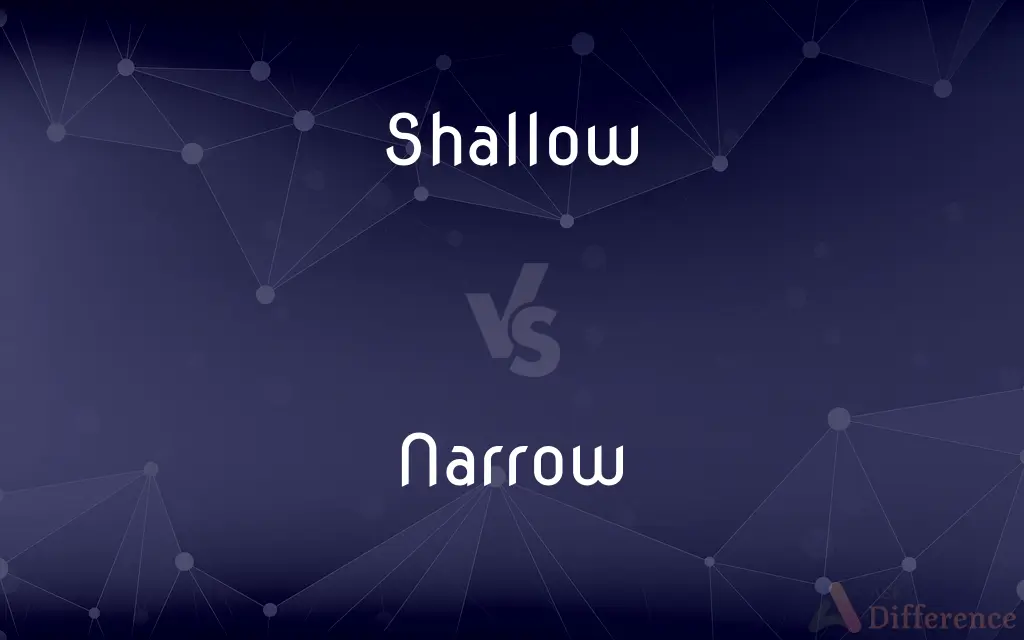Shallow vs. Narrow — What's the Difference?
By Urooj Arif & Fiza Rafique — Updated on March 21, 2024
Shallow describes limited depth, as in water or topics, while narrow refers to limited width or breadth in spaces or concepts.

Difference Between Shallow and Narrow
Table of Contents
ADVERTISEMENT
Key Differences
Shallow primarily relates to depth, indicating a short distance from the surface to the bottom, as seen in shallow waters. On the other hand, narrow focuses on the restricted width or breadth of objects or areas, such as a narrow hallway, emphasizing spatial confinement horizontally.
Shallow can also metaphorically describe a lack of depth in non-physical contexts, like ideas or emotions, suggesting superficiality. Whereas narrow may imply a limited scope or perspective, often used to describe thinking or viewpoints that lack breadth or inclusivity.
In environmental contexts, shallow areas, such as waters, are critical for various ecosystems, providing habitats for specific fauna and flora. Narrow environments, like narrow valleys or canyons, on the other hand, create unique ecosystems due to their restricted spatial dimensions, influencing climate, vegetation, and wildlife.
Shallow depths are easier to measure and observe, making them more accessible for activities like wading or snorkeling. Conversely, narrow spaces, while they may vary in depth, are characterized by their limited horizontal space, affecting accessibility and mobility within them.
In discussions about objects or features, something shallow often requires less material or content to fill, as in a shallow dish. Narrow objects or features, in contrast, require precise placement or arrangement due to their limited width, like narrow shelves.
ADVERTISEMENT
Comparison Chart
Definition
Having little depth
Having limited width
Typical Contexts
Water depth, superficial discussions
Tight spaces, limited perspectives
Metaphorical Use
Lack of depth in knowledge or emotion
Restricted scope or understanding
Environmental Impact
Affects habitats in shallow waters
Influences ecosystems in narrow areas
Practical Implications
Easier to measure and access
Affects mobility and arrangement
Compare with Definitions
Shallow
Superficial or minimal.
He only had a shallow understanding of the subject.
Narrow
Limited in width.
The narrow bridge could only fit one car at a time.
Shallow
Lacking depth of character or understanding.
The novel was criticized for its shallow characters.
Narrow
Precisely defined.
The law was interpreted in a narrow sense by the court.
Shallow
Not intellectually deep.
The discussion remained shallow despite the complex topic.
Narrow
Close-minded.
His narrow views on the subject surprised everyone.
Shallow
Having little depth.
The shallow pond freezes over quickly in the winter.
Narrow
Barely achieved.
They won the game by a narrow margin.
Shallow
Close to the surface.
Shallow roots make the tree vulnerable to strong winds.
Narrow
Restricted in scope.
Her expertise lies in a very narrow field of study.
Shallow
Measuring little from bottom to top or surface; lacking physical depth.
Narrow
Of small or limited width, especially in comparison with length.
Shallow
Lacking depth of intellect, emotion, or knowledge
"This is a shallow parody of America" (Lloyd Rose).
Narrow
Limited in area or scope; cramped.
Shallow
Marked by insufficient inhalation of air; weak
Shallow respirations.
Narrow
Lacking flexibility; rigid
Narrow opinions.
Shallow
In the part of a playing area that is closer to home plate
Shallow left field.
Narrow
Barely sufficient; close
A narrow margin of victory.
Shallow
Often shallows A part of a body of water of little depth; a shoal
Abandoned the boat in the shallows.
Narrow
Painstakingly thorough or attentive; meticulous
Narrow scrutiny.
Shallow
To make or become shallow.
Narrow
(Linguistics) Tense.
Shallow
Having little depth; significantly less deep than wide.
This crater is relatively shallow.
Saute the onions in a shallow pan.
Narrow
To reduce in width or extent; make narrower.
Shallow
Extending not far downward.
The water is shallow here.
Narrow
To limit or restrict
Narrowed the possibilities down to three.
Shallow
Concerned mainly with superficial matters.
It was a glamorous but shallow lifestyle.
Narrow
To become narrower; contract.
Shallow
Lacking interest or substance.
The acting is good, but the characters are shallow.
Narrow
A part of little width, as a pass through mountains.
Shallow
Not intellectually deep; not penetrating deeply; simple; not wise or knowing.
Shallow learning
Narrow
A body of water with little width that connects two larger bodies of water.
Shallow
(obsolete) Not deep in tone.
Narrow
A part of a river or an ocean current that is not wide.
Shallow
(tennis) Not far forward, close to the net.
Narrow
Having a small width; not wide; having opposite edges or sides that are close, especially by comparison to length or depth.
A narrow hallway
Shallow
(angles) Not steep; close to horizontal.
A shallow climb; a shallow descent; a shallow bank angle
Narrow
Of little extent; very limited; circumscribed.
Shallow
A shallow portion of an otherwise deep body of water.
The ship ran aground in an unexpected shallow.
Narrow
(figuratively) Restrictive; without flexibility or latitude.
A narrow interpretation
Shallow
A fish, the rudd.
Narrow
Contracted; of limited scope; bigoted
A narrow mind
Narrow views
Shallow
(historical) A costermonger's barrow.
Narrow
Having a small margin or degree.
A narrow escape
The Republicans won by a narrow majority.
Shallow
(ambitransitive) To make or become less deep.
Narrow
(dated) Limited as to means; straitened
Narrow circumstances
Shallow
Not deep; having little depth; shoal.
Narrow
Parsimonious; niggardly; covetous; selfish.
Shallow
Not deep in tone.
The sound perfecter and not so shallow and jarring.
Narrow
Scrutinizing in detail; close; accurate; exact.
Shallow
Not intellectually deep; not profound; not penetrating deeply; simple; not wise or knowing; ignorant; superficial; as, a shallow mind; shallow learning.
The king was neither so shallow, nor so ill advertised, as not to perceive the intention of the French king.
Deep versed in books, and shallow in himself.
Narrow
(phonetics) Formed (as a vowel) by a close position of some part of the tongue in relation to the palate; or (according to Bell) by a tense condition of the pharynx; distinguished from wide.
Shallow
A place in a body of water where the water is not deep; a shoal; a flat; a shelf.
A swift stream is not heard in the channel, but upon shallows of gravel.
Dashed on the shallows of the moving sand.
Narrow
A narrow passage, especially a contracted part of a stream, lake, or sea; a strait connecting two bodies of water.
The narrows of New York harbor
Shallow
The rudd.
Narrow
(transitive) To reduce in width or extent; to contract.
We need to narrow the search.
Shallow
To make shallow.
Narrow
(intransitive) To get narrower.
The road narrows.
Shallow
To become shallow, as water.
Narrow
(of a person or eyes) To partially lower one's eyelids in a way usually taken to suggest a defensive, aggressive or penetrating look.
He stepped in front of me, narrowing his eyes to slits.
She wagged her finger in his face, and her eyes narrowed.
Shallow
A stretch of shallow water
Narrow
(knitting) To contract the size of, as a stocking, by taking two stitches into one.
Shallow
Make shallow;
The silt shallowed the canal
Narrow
To convert to a data type that cannot hold as many distinct values.
To narrow an
int variable to a short variableShallow
Become shallow;
The lake shallowed over time
Narrow
Of little breadth; not wide or broad; having little distance from side to side; as, a narrow board; a narrow street; a narrow hem.
Hath passed in safety through the narrow seas.
Shallow
Lacking physical depth; having little spatial extension downward or inward from an outer surface or backward or outward from a center;
Shallow water
A shallow dish
A shallow cut
A shallow closet
Established a shallow beachhead
Hit the ball to shallow left field
Narrow
Of little extent; very limited; circumscribed.
The Jews were but a small nation, and confined to a narrow compass in the world.
Shallow
Not deep or strong; not affecting one deeply;
Shallow breathing
A night of shallow fretful sleep
In a shallow trance
Narrow
Having but a little margin; having barely sufficient space, time, or number, etc.; close; near{5}; - with special reference to some peril or misfortune; as, a narrow shot; a narrow escape; a narrow miss; a narrow majority.
Shallow
Lacking depth of intellect or knowledge; concerned only with what is obvious;
Shallow people
His arguments seemed shallow and tedious
Narrow
Limited as to means; straitened; pinching; as, narrow circumstances.
Narrow
Contracted; of limited scope; illiberal; bigoted; as, a narrow mind; narrow views.
Narrow
Parsimonious; niggardly; covetous; selfish.
A very narrow and stinted charity.
Narrow
Scrutinizing in detail; close; accurate; exact.
But first with narrow search I must walk roundThis garden, and no corner leave unspied.
Narrow
Formed (as a vowel) by a close position of some part of the tongue in relation to the palate; or (according to Bell) by a tense condition of the pharynx; - distinguished from wide; as ē (ēve) and Ō (fŌd), etc., from ĭ (ĭll) and Ŏ (fŎt), etc. See Guide to Pronunciation, 13.
Narrow
A narrow passage; esp., a contracted part of a stream, lake, or sea; a strait connecting two bodies of water; - usually in the plural; as, The Narrows of New York harbor.
Near the island lay on one side the jaws of a dangerousnarrow.
Narrow
To lessen the breadth of; to contract; to draw into a smaller compass; to reduce the width or extent of.
Narrow
To contract the reach or sphere of; to make less liberal or more selfish; to limit; to confine; to restrict; as, to narrow one's views or knowledge; to narrow a question in discussion.
Our knowledge is much more narrowed if we confine ourselves to our own solitary reasonings.
Narrow
To contract the size of, as a stocking, by taking two stitches into one.
Narrow
To become less broad; to contract; to become narrower; as, the sea narrows into a strait.
Narrow
Not to step out enough to the one hand or the other; as, a horse narrows.
Narrow
To contract the size of a stocking or other knit article, by taking two stitches into one.
Narrow
A narrow strait connecting two bodies of water
Narrow
Make or become more narrow or restricted;
The selection was narrowed
The road narrowed
Narrow
Define clearly;
I cannot narrow down the rules for this game
Narrow
Become more special;
We specialize in dried flowers
Narrow
Become tight or as if tight;
Her throat constricted
Narrow
Not wide;
A narrow bridge
A narrow line across the page
Narrow
Limited in size or scope;
The narrow sense of a word
Narrow
Lacking tolerance or flexibility or breadth of view;
A brilliant but narrow-minded judge
Narrow opinions
Narrow
Very limited in degree;
Won by a narrow margin
A narrow escape
Narrow
Characterized by painstaking care and detailed examination;
A minute inspection of the grounds
A narrow scrutiny
An exact and minute report
Common Curiosities
Can "shallow" be used metaphorically?
Yes, shallow can describe a lack of depth in knowledge, emotion, or interest.
What does "shallow" mean in a physical sense?
In a physical sense, shallow refers to having little depth.
What does a "narrow perspective" imply?
A narrow perspective implies a limited or restricted viewpoint.
What kind of environments are considered narrow?
Narrow environments include tight spaces like canyons or narrow streets.
How do shallow waters affect ecosystems?
Shallow waters provide vital habitats for many species and support diverse ecosystems.
Can something be both shallow and narrow?
Yes, an object or area can be both shallow and narrow, limiting both depth and width.
Is it negative to describe ideas as shallow?
Typically, yes, it suggests a lack of depth or thorough understanding.
Why might narrow roads be challenging?
Narrow roads can be difficult due to limited space for vehicles to pass or maneuver.
How is "narrow" commonly used?
Narrow is commonly used to describe something limited in width.
Are shallow and narrow interchangeable?
No, they refer to different dimensions; shallow is about depth, while narrow concerns width.
How does narrowness affect mobility?
Narrowness can restrict movement and access, requiring careful navigation.
Why is depth important in discussions about shallow and deep?
Depth is crucial because it determines the volume and type of activities possible in a given space.
How do shallow and narrow compare in non-physical contexts?
In non-physical contexts, shallow often means lacking depth or substance, while narrow implies a limited range or scope.
What does having a narrow focus mean?
Having a narrow focus means concentrating on a limited area or subject.
Can landscapes be described as shallow?
Not typically; shallow is more commonly used for water bodies or discussions of depth.
Share Your Discovery

Previous Comparison
Shaker vs. Quaker
Next Comparison
Synchronization vs. SyntonizationAuthor Spotlight
Written by
Urooj ArifUrooj is a skilled content writer at Ask Difference, known for her exceptional ability to simplify complex topics into engaging and informative content. With a passion for research and a flair for clear, concise writing, she consistently delivers articles that resonate with our diverse audience.
Co-written by
Fiza RafiqueFiza Rafique is a skilled content writer at AskDifference.com, where she meticulously refines and enhances written pieces. Drawing from her vast editorial expertise, Fiza ensures clarity, accuracy, and precision in every article. Passionate about language, she continually seeks to elevate the quality of content for readers worldwide.















































